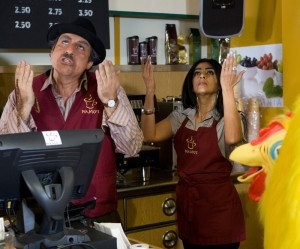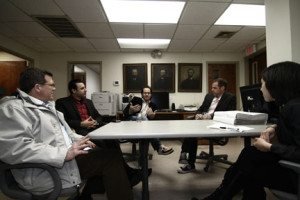WATERTOWN, Mass. (A.W.)—Sneak-peek screenings at film festivals have already created a buzz around the indie film “My Uncle Rafael,” featuring an eccentric old Armenian character, Uncle Rafael, played by Vahik “Vic” Pirhamzei.

“My Uncle Rafael” promises to be a hilarious meeting point of Hollywood swank and a charmingly coarse old-world heart. Michele (Rachel Blanchard), a TV producer, sets her sights on a 71-year-old Armenian “uncle” as the star of her new reality TV show. Uncle Rafael is thrown in with the all-American but dysfunctional Schumacher family, with the challenge of saving the couple’s failing marriage. There is only one rule: All must follow the old Armenian’s rules. Uncle Rafael has one week to succeed in his mission while living with the pair, their two children, the producer, and the camera crew.
Uncle Rafael is a universal character, the filmmakers said during an interview with the Armenian Weekly in April. Director Marc Fusco, writer/producers Vahik Pirhamzei and Scott Yagemann, and producer Michael Garrity, who were in Boston for the screening of their film at the Boston International Film Festival, and still under the effects of a post-screening high, established that what made Uncle Rafael Armenian was his deeply rooted pride. His other characteristics, like his “old-man stubbornness,” are merely universal features of an old, seasoned man.
In fact, no one really takes Rafael seriously. He walks and talks funny, shuffles around, rosary beads in hand, but gets everyone to do exactly what he wants them to do—and somehow, it all works out.
“He just happens to be Armenian,” said Pirhamzei, 42. The key was having a well-developed character that audiences can identify with. “But we will take credit for it,” he added, “because what ‘My Big Fat Greek Wedding’ did for the Greeks, this will do for the Armenians.”
“We were lucky that he is Armenian,” added Fusco, a former Steven Spielberg assistant. “It’s a culture that hasn’t been shown in this way ever before. It’s a very rich culture.”
From stage to film
“Rafael Keri” (“Uncle Rafael,” in Armenian) was Pirhamzei’s small stage play franchise. The Uncle Rafael plays—“Mez Lavutyan Chi Yekel” (He Hasn’t Come for Our Good), “Rafael Keri Gandzere” (Uncle Rafael, the Treasures), and “Rafael Keri Bardezeh” (Uncle Rafael, the Garden)—all drew enthusiastic audiences. “They came, paid $30 per ticket, $40, to watch the play,” said Pirhamzei. The play sold over 35,000 tickets in Los Angeles alone—a fact Pirhamzei noted with pride. So he began to polish Rafael’s character, “like a diamond,” but soon decided it was time for “professional help.”
That is when Pirhamzei reached out to Yagemann, a screenwriter for Warner Brothers. The writer’s first response was, “Armenian? Interesting! I don’t know [anything] about Armenians. That’s good,” recalled Pirhamzei.
“To me, all characters are universal,” explained Yagemann, who was also thrilled to learn that Pirhamzei played two of the leading roles—Uncle Rafael and his son, Hamo. “He’s the Armenian Tyler Perry!” he said.
Although Pirhamzei was not part of the mainstream movie world, Yagemann acknowledged Pirhamzei’s talent and passion, and introduced him to Fusco and

Garrity, two filmmakers he had worked with in the past. The new recruits had their share of hesitations and apprehensions because, as Garrity said, “It’s a year of your life, no matter what.” Fusco finally decided to watch DVD’s of Pirhamzei’s plays—in Armenian—and realized that Pirhamzei was brilliant on the stage. “He directed, produced, and starred in the stage plays—and the audience is dying,” Fusco said. “They are literally laughing their asses out of their chairs. This guy commands the stage. Even if he hasn’t done an American film yet, he has all the tools, and we can totally make this happen.”
Gathering the troops
The real challenge was to assemble a solid cast, experienced actors who would agree to support Rafael’s character, played by an actor virtually unknown to Hollywood. In the end, the movie was going to live or die with Pirhamzei.
The task rested squarely on Garrity’s shoulders. “That was my toughest job, dealing with all these agents and managers going, ‘Who’s this dude [about Pirhamzei]? It’s in Armenian. I don’t know what he’s talking about. That’s not funny!’ We had to find really crafty ways [to attract the actors], and that was very hard,” he said. But after meeting Rafael and Hamo, the cast was impressed. They realized that ‘Oh ok, this guy is the real deal,’” said Garrity.
That cast includes Anahid Avanesian (as Linda, a role she had also embraced in Uncle Rafael’s theater days); Missi Pyle (Blair Schumacher); John Michael Higgins (bad guy Damon); Anthony Clark (Jack Schumacher, the nice guy facing a divorce); Joe Lo Truglio (Father Jim); and Rachel Blanchard (Michele, the producer).
Making the film
Five-hour make-up sessions and a case of semi-arthritis made the pre-filming preparations arduous for the main star. He dreaded them, feeling like a kid who did not want to go to school. “Sitting in that make-up chair for hours and hours, with six to eight pieces they’re putting together [motions to his face], and the first piece takes 45 minutes, and then you know you have five more [to go], you just want to cry… That’s one day, and then the second day, and then you have another 16 days to go,” he said. The transformation is stark; it’s hard to believe Hamo and Rafael are played by the same actor.
Playing both roles, Pirhamzei had to fully embrace each character, to the point where he’d respond only if called by the name of the character he was playing—and certainly not “Vahik.” The challenge for him was assuming the role of co-producer alongside Garrity, who he’d meet every morning in the make-up trailer. Pirhamzei proved to have an ability in compartmentalizing his many roles on the set. Taking him seriously, however, proved to be hard for some. “I would try not to tell him all the things that were going on—the fires that needed to be put out,” said Garrity. “I would come into the trailer every morning, and sometimes he would be upset… He would be in half-Rafael makeup. So I’d be like, ‘You look silly, so I’m going to go work it out. I’ll see you later,’” Garrity recalled.
[monoslideshow id=30]
Much of the credit goes to the clear script and the cast who, in Garrity’s own words, “would bring you gem.” In the end, it was director Fusco’s versatility and vision that made the highlights of the movie possible.
Twenty-five percent of the funny moments in the movie were the result of improvisations. Fusco knew that, if given the opportunity, the cast would come up with great comedic moments, so he would instruct them to abandon the script and improvise. For instance, the scene (also in the trailer) where Michelle spells out “D.I.V.O.R.C.E.” and Rafael responds, “Driving License?” was not in the script.
Four weeks of 16-hour days in pre-production, 18 days of shooting, post-production, focus groups, and public screenings, and the filmmakers have reached the year mark.
Sequel potential
Although “My Uncle Rafael” has not yet been signed on by a major distributor, they are being watched. “There’s a universal fear of something new,” said Fusco. “We realize it’s going to take slightly longer to make everybody feel safe.”
The crew has been filming behind-the-scenes reactions at screenings, and they are optimistic. Two public screenings and eight focus group screenings proved that both Armenians and non-Armenians alike will thoroughly enjoy this light-hearted family comedy.
http://www.youtube.com/watch?v=KTY8PCDji7U“Armenians, especially when they see it in a non-Armenian audience, get goose bumps. They feel so proud,” said Pirhamzei, who recently starred in the hit Armenian TV drama series “Immigrants” for USArmenia Networks.
There is potential for a sequel, or even a television show. It all depends on the success of the first. “If there is success with the first one, they will push us to do a sequel, whether we feel that it would be great or not,” said Garrity, but confessed that, “oddly,” there has been more talk about a TV show.
Yagemann agreed. “I always saw it as a franchise character. That’s one of the things that attracted me [to it]. Cause I saw it like ‘Uncle Rafael Goes to Europe,’ ‘Uncle Rafael Mugs Someone,’” he mused. Tyler Perry, with his Madea character, proved that this model works, added Fusco. “Uncle Rafael and Madea Go to Jail,” Garrity chimed in.
By the end of summer or very early fall, “My Uncle Rafael” will make it to the big screen, they say. When that happens, grab a box of nazouks, the Armenian cookies that were a staple on the movie set, and head to your nearest theater for a good 90-minute laughing session. And, as Rafael Keri says, “Hoy hoy!”


AN EXCELLENT MOVIE THAT NO ARMENIAN SHOULD MISS. I HAD THE PRIVILEGE OF SEEING THE PREMIERE IN TORONTO AND I ENJOYED IT VERY MUCH.